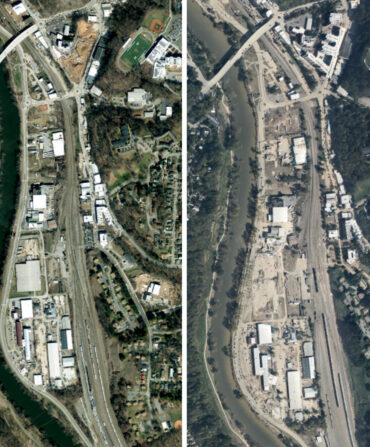hurricane helene
Whole Towns Were Swept Away After Helene. How One Couple Got Out Alive.
“Lake Lure is the remnants of Chimney Rock now,” says Lizzie Brewer, who escaped mudslides and roaring water in North Carolina, then went back to help others before evacuating by helicopter
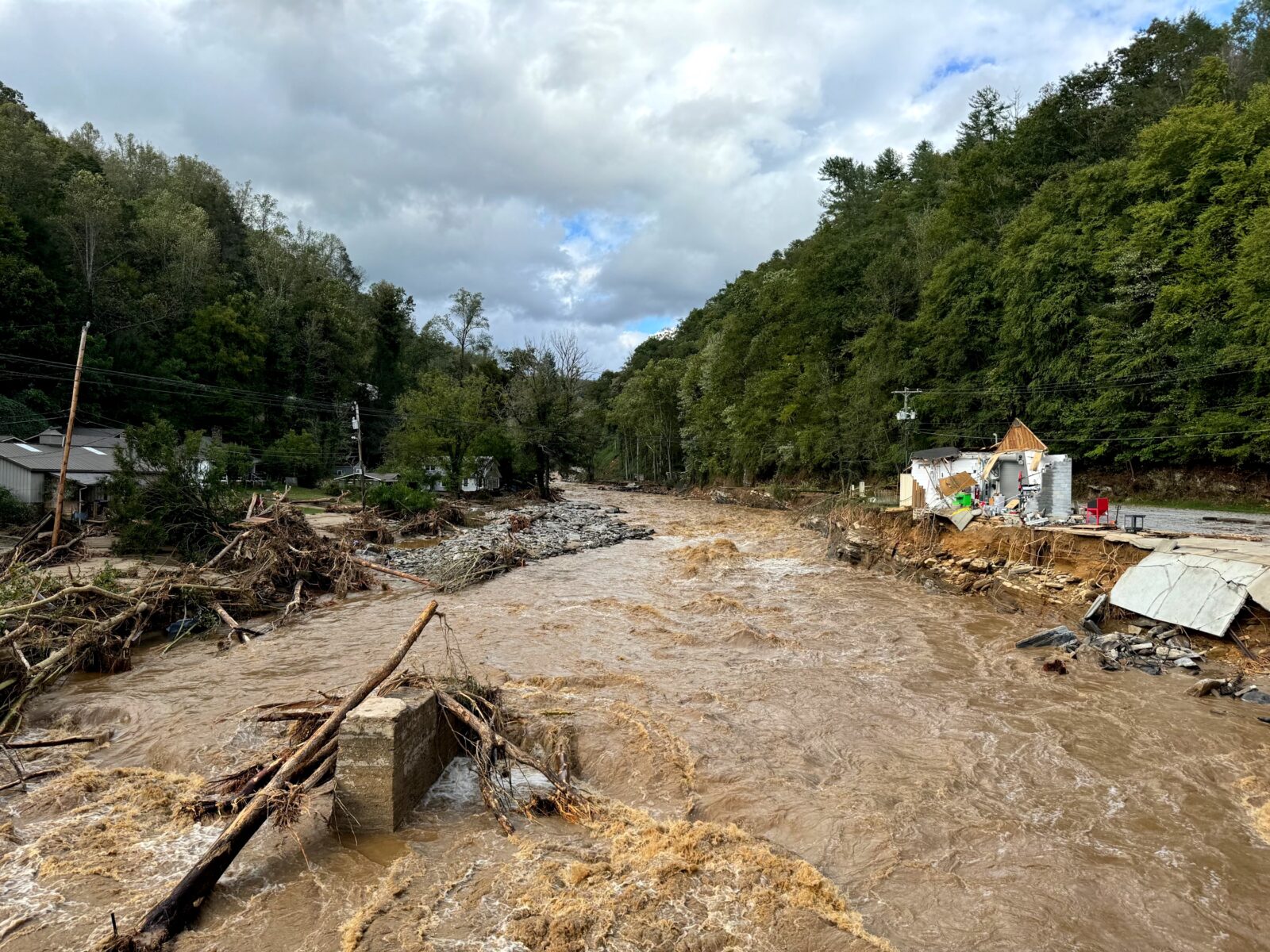
Photo: Tyler Covarrubias
Damaged roads and structures in Bat Cave, North Carolina, following Helene.
Lizzie Brewer is glad to be alive, but right now, all she can think about are the people who still need help in the Appalachian Mountains. “I don’t think people realize how many people are actually still there and how catastrophic it is,” she says. “We aren’t going to know how many people died for a long time.”
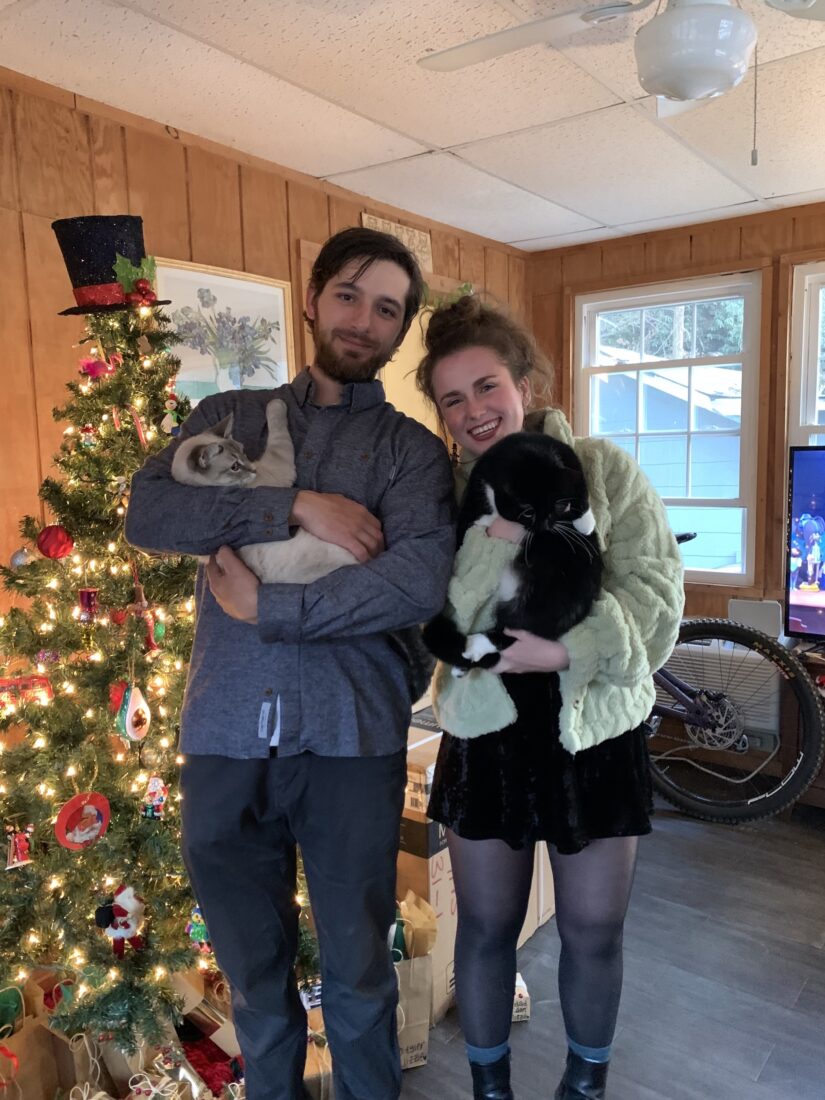
Photo: Courtesy of Lizzie Brewer
Tyler Covarrubias and Lizzie Brewer with their cats, Finnegan and Fiona.
Early Friday morning, Brewer was asleep at home in Bat Cave, North Carolina, in the former fishing camp she rents with her boyfriend, Tyler Covarrubias, not far from the Broad River. Bat Cave sits just three miles from Chimney Rock and Lake Lure. “We had our windows open, and I could feel the rain misting in. I could hear the sound of the river.” It grew louder. The night before, they had heard that Hurricane Helene was about to hit Florida. Lizzie grew up in nearby Brevard and went to Appalachian State in Boone, and Tyler is originally from Virginia—meaning they are familiar with how remnants of hurricanes in the Gulf or Atlantic can spin off into rain and wind storms in the mountains. But this was different.
As the sun rose, and as Helene turned into a tropical storm over a huge swath of the Southeast, the water climbed even closer to their house. Then they heard trees falling. “We realized it was too late to make a move—it seemed like it was too dangerous for us to drive anywhere,” Lizzie says. “We noticed our neighbors across the bridge were home, so we waved to them to come over, please come over! Waves of water were starting to lap at their car, but somehow they made it over to our side.”
The small group huddled together at the house. “But the water was rising so fast, we gathered our animals—they had a cat, and we have two cats.” Finnegan and Fiona. “We had to get to higher ground.”

Photo: Tyler Covarrubias
The view of the rising river before it overtook Highway 9 in front of Brewer's home.
The neighbors tried to drive in their truck, with Lizzie and Tyler following in their car. But just a hundred feet from the house, they got stuck. “Our neighbor got out of the truck in front of us and as soon as she does, we hear crumbling and crackling as a landslide looks like it’s coming toward us. We evacuate the cars, in shock that we didn’t get hit by this landslide. We were all convinced we were going to die.”

Photo: courtesy of Lizzie Brewer
An abandoned vehicle in Bat Cave, North Carolina.
They were surrounded by landslides on Highway 9. “We sat there what felt like an hour, but it could have been only five minutes. I can’t process how long we were sitting there. We had been calling 911, trying to get a signal. We didn’t think anyone could get us unless it was a helicopter.”

Photo: Tyler Covarrubias
Trekking through a landslide on Highway 9.
Finally, they heard voices and saw neighbors walking toward them. “A tiny piece of road was intact, and they helped us across,” Lizzie says. “I had one cat, and I handed them another, and they helped take us to higher elevation, up the side of the mountain. We took shelter in their house that was completely intact, despite water flowing all around us. They gave us a dry place to stay, dry clothes, and let us wait out the storm so we could hike back down.”
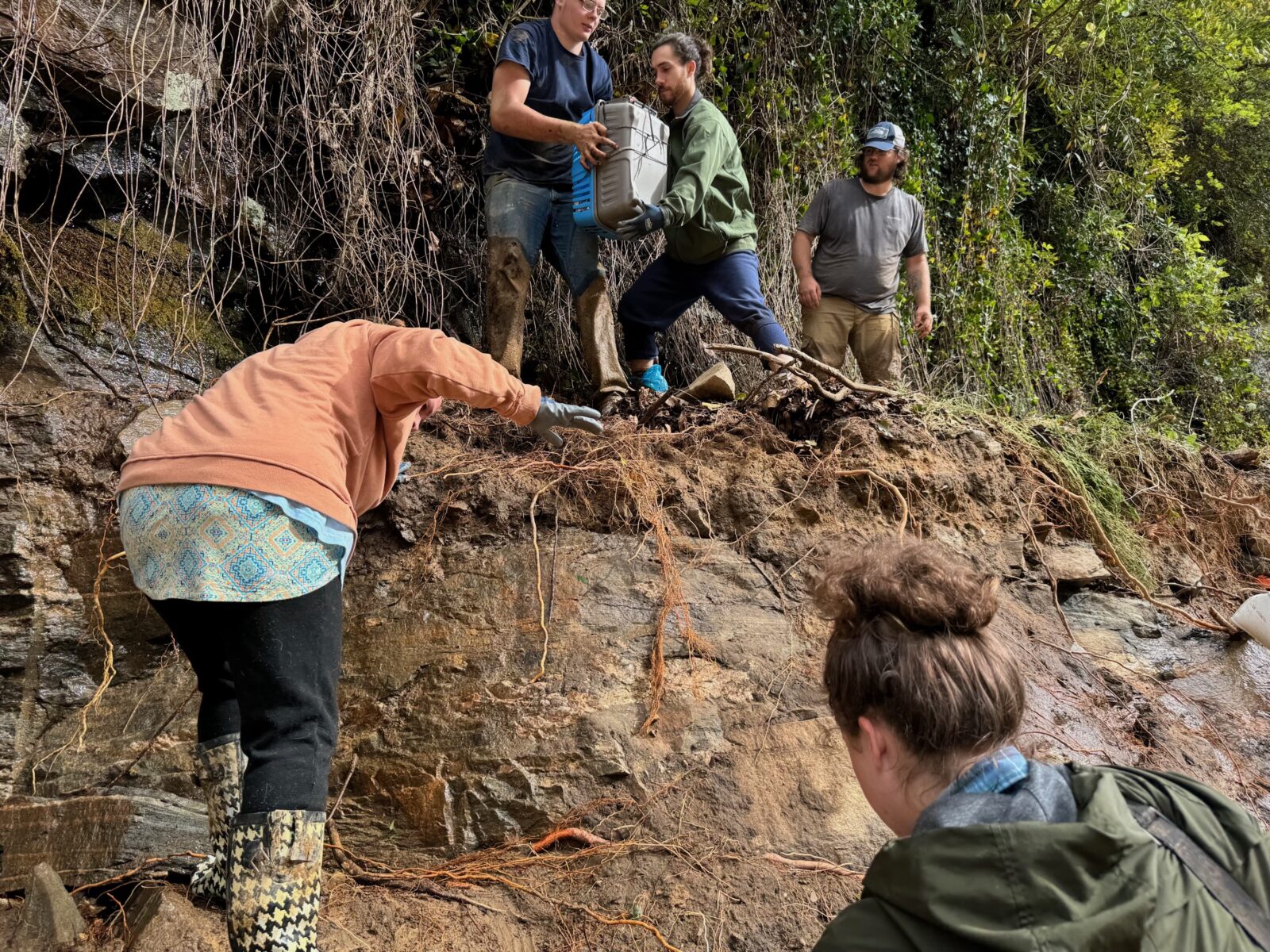
Photo: Tyler Covarrubias
The couple and their neighbors climbing to higher ground.
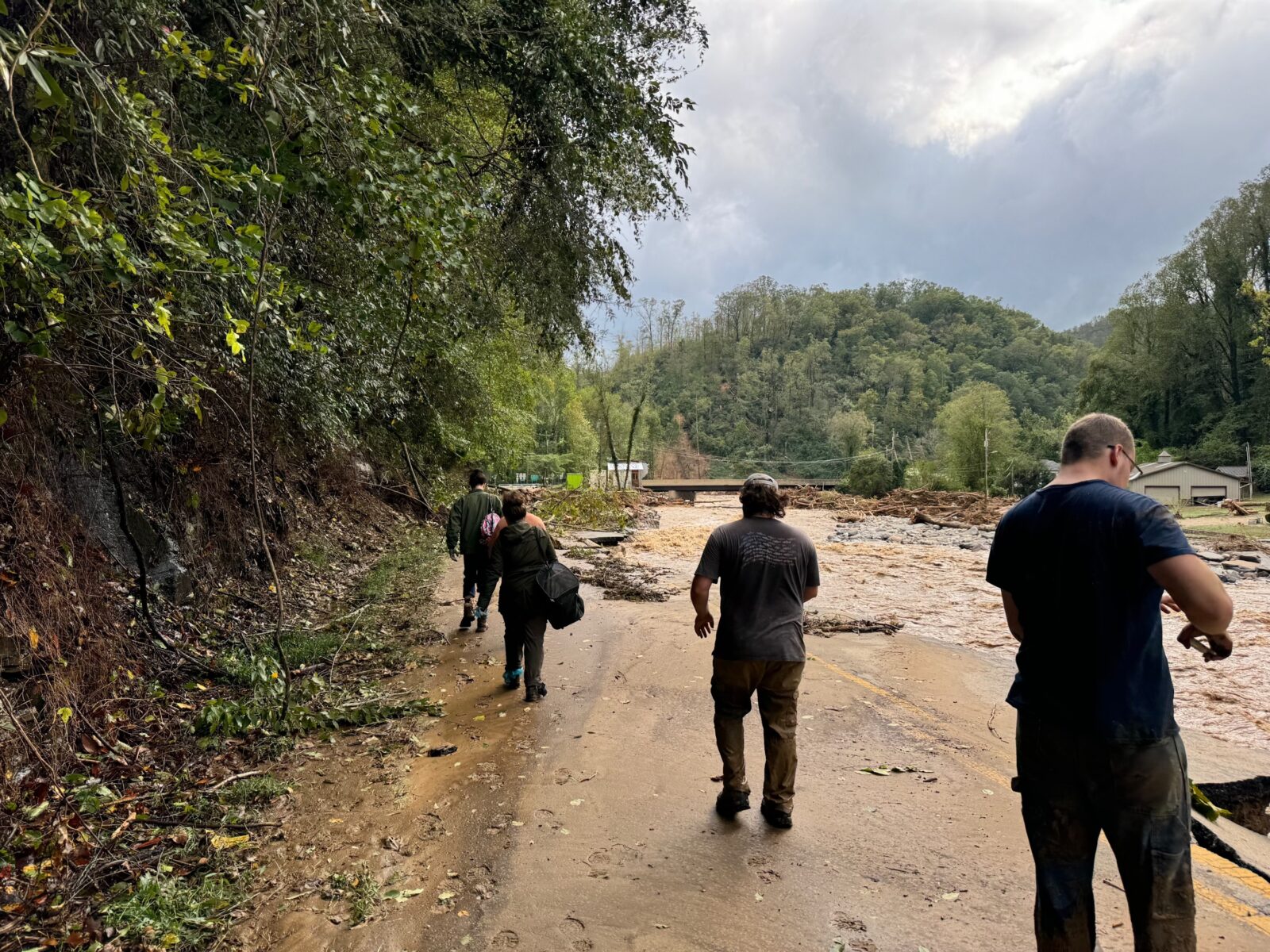
Photo: Tyler Covarrubias
Neighbors lend a hand in transporting pets.
When the storm died down, Lizzie, Tyler, the neighbors, and the animals trekked back to what remained of their properties. “As we’re walking back, we turn the bend to see where we had abandoned the cars, and the road was just completely gone. Every single house that had been there was just gone. Our neighbors’ house had washed away—no foundation, no proof of existence that a house was ever even there. We could see our house, which was on an island surrounded by river and mud on what used to be a road.”
Lizzie and Tyler entered their home, which was surprisingly intact, and started gathering necessities. “Our neighbors lost everything they owned, they had the clothes on their back and their cat. So we used that time to pack some things up for all of us.” They hiked along a crumbling riverbed and made it to the Bat Cave Volunteer Fire Department.
“The fire department took us in with open arms. They took care of us, gave us food and water, gave us space for our cats,” Lizzie says. “At that point we felt safe, and we went out to help others.”
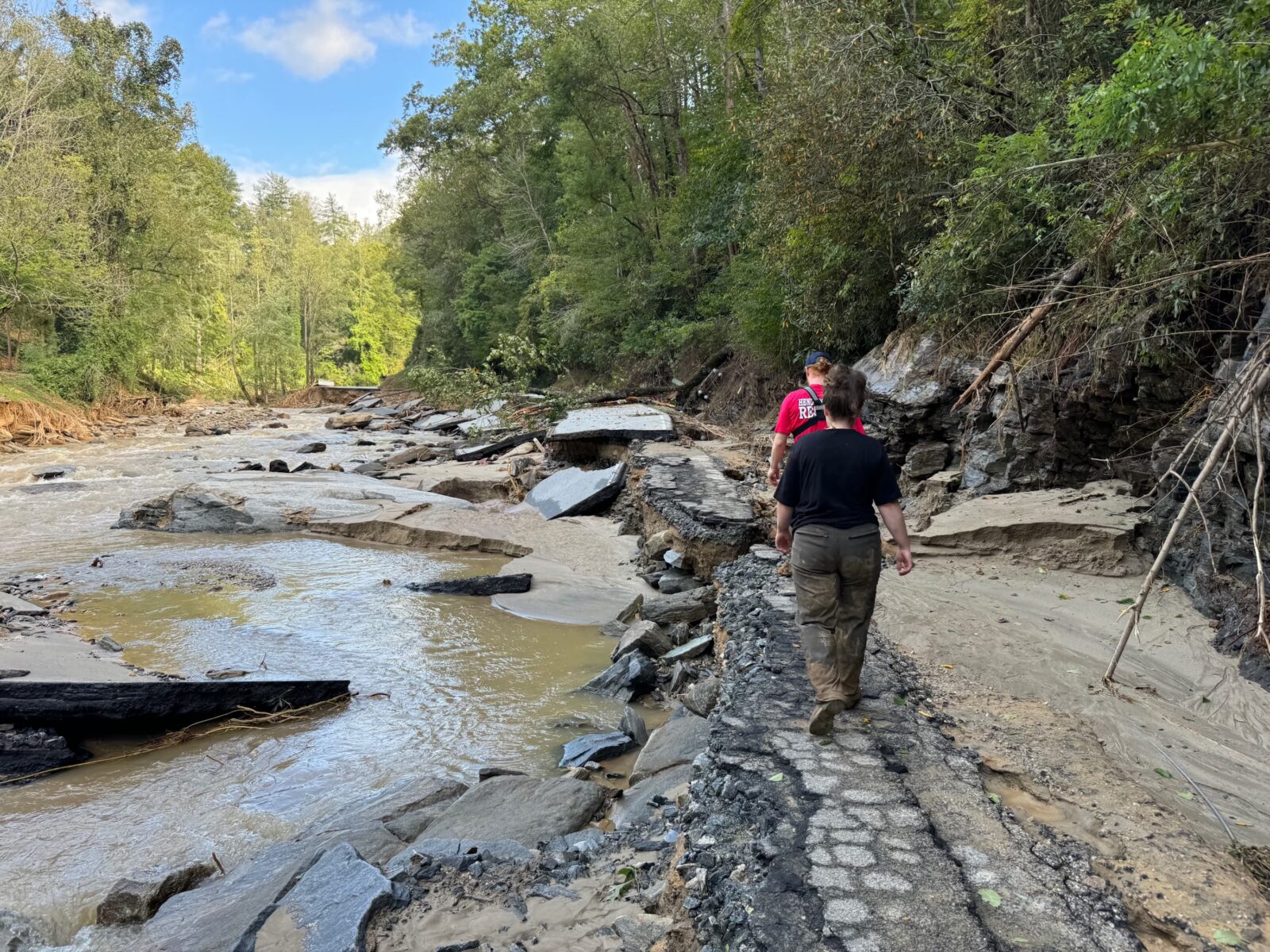
Photo: Tyler Covarrubias
Assisting in search efforts.
Along with other survivors, Lizzie and Tyler walked everywhere they could to find people in need, or who hadn’t yet been reached. “I remember the firefighters would say, okay we tried plan A, that’s gone. We tried B, and C, and now let’s try D. Everybody was trying to find other people to help, to do whatever we could. We were also trying to find a way out.”
At this point, the outside world saw the North Carolina Department of Transportation alert that all roads to and in Western North Carolina should be considered closed. But communication was difficult within and among the mountain communities, where residents were left to rely on each other.
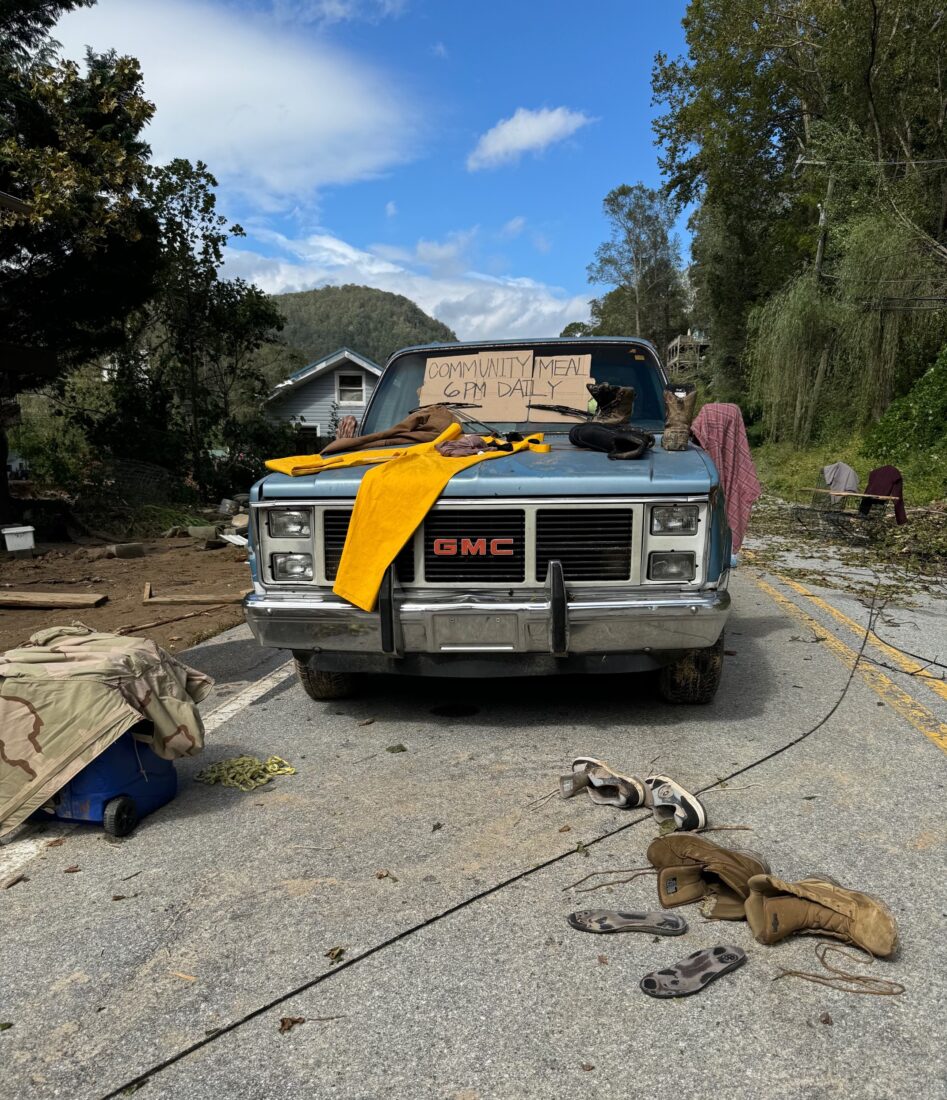
Photo: Tyler Covarrubias
Without cell service, community members put up signs to offer meals to neighbors that may be passing by.
“We spent Friday night at the fire station on cots,” Tyler says. “And a man provided us quilts that his grandmother made.”
The next morning, they continued to try to find a way out, and worked with the rescue squad to locate people who were injured or might need water or supplies. At last, on Saturday afternoon, a National Guard helicopter arrived. Tyler and Lizzie and their two cats, plus another woman and her son, and a man with a prosthetic leg and his dog, lifted off, for the first time seeing the scope of the destruction.

Photo: Tyler Covarrubias
A destroyed home.

Photo: Tyler Covarrubias
A downed power line in front of the Bat Cave post office.
“I had just been in survival mode,” Lizzie says. “But flying over and getting that bird’s eye view of how bad the damage was, I broke down. That was the first time I was able to break down.”
“We had seen whole families, we saw elderly people who cannot get through this destruction,” she says. “The neighborhoods reach all the way to the tops of mountains. Helicopters can only reach some places. We need people who can climb mountains and carry people down.”
They landed sixteen miles away, in Edneyville, North Carolina. They eventually reconnected with some of Lizzie’s family in South Carolina and have been following updates on social media. “We knew Chimney Rock was just gone. People were telling each other about it. Lake Lure is the remnants of Chimney Rock now. My mom showed me a picture and it doesn’t even look like there’s water in it, it’s so covered in mud, pieces of wood that look like toothpicks. Entire buildings were washed into the lake.”
They also started seeing reports of emergency responders, like this one from Pamlico County Emergency Management:
The Lake Lure Local and the Rutherford County Emergency Management Facebook pages have become vital sources of information in Rutherford County, as many people outside the region are still struggling to get word of their loved ones. Reddit, too, has become an in-the-moment resource around Asheville, with users updating a daily “mega-thread” with information on water, supplies, and missing individuals.
Lizzie wanted to share her story in the hopes that it will draw attention to the still-urgent needs. She’ll never forget being up in the helicopter, seeing the destruction below—trees down, landslides, everywhere mud and river gone wild. “But then all of a sudden, the mountains are green again. No damage. I looked back and forth to see the contrast. It felt unfair, I thought, do people even know?

Photo: Tyler Covarrubias
A washed-out road.


